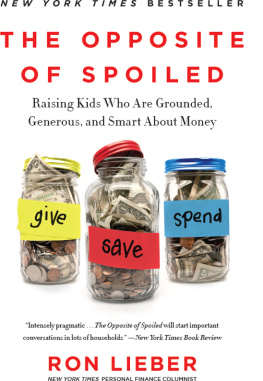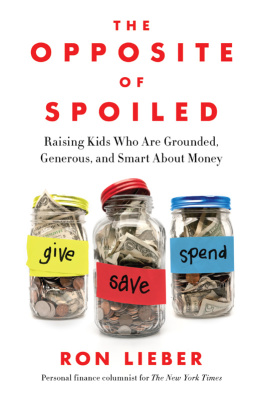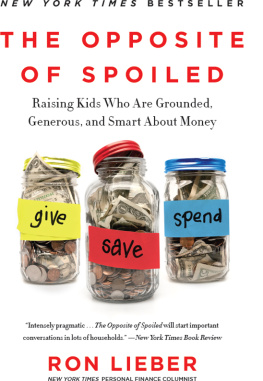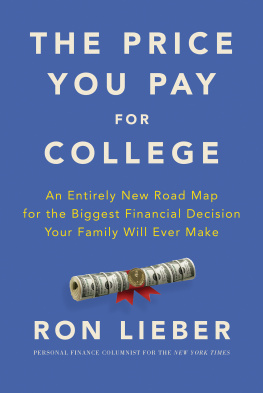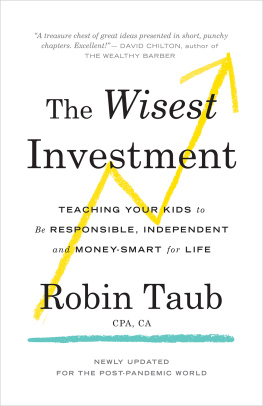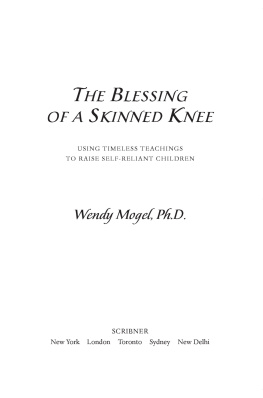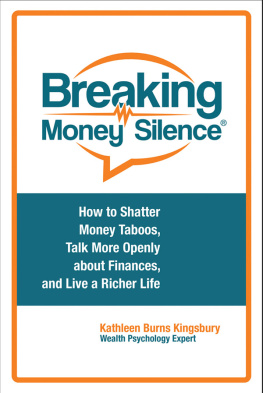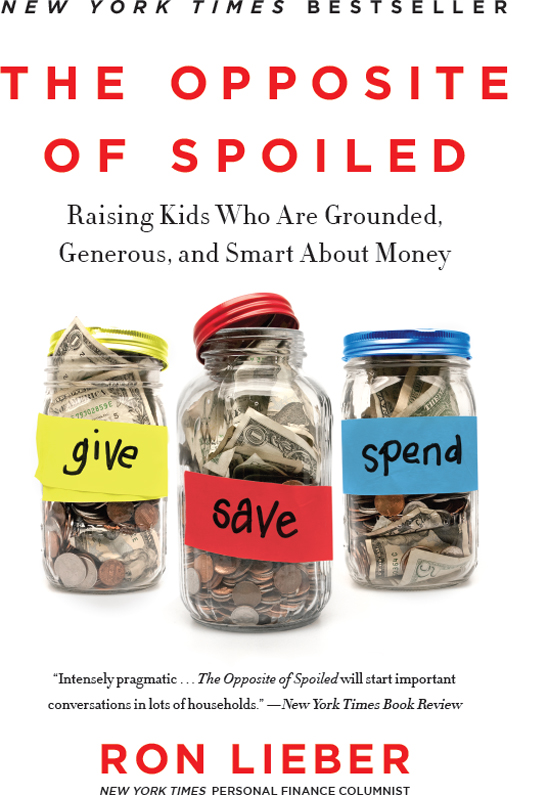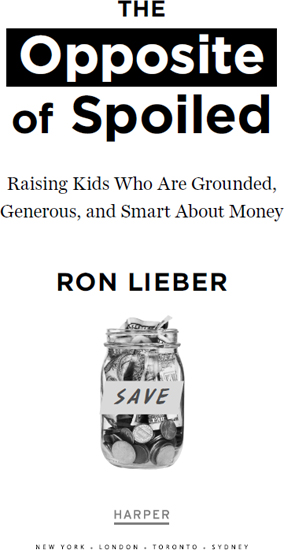This book is intended to start conversations about money in our families, schools, and communities. But its meant to be only the first word, not the last one.
While Ive made the basic assumption that most readers have household incomes above $50,000 or so, just about all the tips and ideas can work just as well for families who make less and for those who have millions at their disposal. Take these blueprints, make them your own, try different tips on different kids at different ages, and please let me know how it worked out for you. You can contact me through my website, http://ronlieber.com.
I use the first person singular and pluralI and weand the term kids often in this book, for two reasons. We parents are all in this together, and I think most of us want the same things for our kids when it comes to imprinting good values, virtues, and character traits. As for the plural kids, its just for convenience; as the father of one child myself, I know that not every family has two or more. Using kids simply allows me to avoid gendered pronouns like he or she.
I tested many of these ideas and first encountered some of the people youll meet in the book on my Facebook page, http://facebook.com/ronlieberauthor. Please Like the page to follow along as the discussion evolves in the coming years. Other ideas came from talks Ive given for schools and community groups around the country and from my writing for TheNew York Times.
Every quote in this book is real, as are all the people who appear here. The incidents I describe are true as well, and there are no composites. In a couple of places in the text, I changed names or towns (but nothing else) when my subjects did not want to draw too much attention to themselves or feared embarrassing family members or friends. The names Magnolia Davis, Bramson Dewey, Lucy Gilchrist, and Stephanie Joss are not the real ones.
I n the middle of 2011, in the space of a single week, I heard from two different parents struggling with uncomfortable questions about money. A national conversation about inequalityabout who had money, and how much and whywas beginning. A presidential campaign the following year was going to turn, in part, on who could best represent all of America.
Nobody knew how large and loud the conversation was going to be. But a bunch of curious middle and high school kids were making inquiries as they read the news and connected it to strains in their own communities. Are we rich? Who do we know who is rich? Why did you choose your job when you could have chosen something else that would have let us have a nicer home and go on better vacations?
Their parents didnt know how to respond, and I knew right away why they had come to me for answers. Schools arent good at dealing with questions like these. If teachers answer them by talking about government and taxes and policy, the responses can start to sound political (and boring). If they respond by addressing individual behavior and ambition, the answers start to seem like moral judgments. No matter how it comes up in the classroom, kids come home and start sensitive conversations and the administrators phones start ringing the next morning with parental complaints. At private schools, where there is more freedom in the curriculum, talking about money and social class is particularly complex. There, most families feel lucky to have enough money to send their kids to the school or receive financial aid to attend, but parents and administrators get flustered if anyone brings up the topic of affluence and its effect on children.
Big Questions, Strong Feelings
Journalists, though? We love uncomfortable questions. And starting the year before I heard from the two parents, Id been collecting the gnarliest ones that kids of all ages were asking about money. Each time I heard a good one, Id put it up on TheNew York Times website. Why is that person asking us for money at the red light? Shouldnt we give our second home to someone who doesnt have one? Why dont we have a second home? Do you make less money than Daddy? Are we poor? Are people without nice clothes lazy? Will we run out of money now that you have no job? I suggested an answer for each one, readers pitched in with improvements, and everyone found it plenty useful. My own daughter, who is now 9 years old, was asking some of those questions herself, so I was testing the answers at home as I wrote.
The two parents who contacted me had been following these conversations online. And they had a challenge for me, disguised as an invitation. Would I speak to two groups of parents at their childrens schools and give them ideas about how to talk to their kids about money? And could I please keep in mind that some of the families with more money than average were starting to feel demonized and those with less were feeling like their noses were being rubbed in everyone elses affluence? It would help, they added, if I could discuss the issues in a way that would not leave everyone in the room feeling resentful or inadequate.
Instantly, I said yes. There arent that many fundamentally new challenges in the worlds of parenting or money, but this felt like one of them. And it was new for a couple of reasons.
In the past few decades, scholars have piled into a field that has come to be known as behavioral economics. If youve read any of the Freakonomics books, you know what this is about. Human quirks and emotions have a profound impact on economic decisions, from governments right on down to individuals. A ton of feelings are tied up in the decisions we make about our money and the amount we earn and have at any given moment. On one hand, theres often pride and joy and excitement about the things were able to afford. But sometimes doubt and shame and embarrassment and envy creep in. Most people who read their credit or debit card statements carefully each month have felt many of these feelings at least once. And as Ive discovered in my decade of writing about money for The Wall Street Journal and The New York Times, learning to recognize and control these emotions is the most important factor in picking the right mutual fund and shopping for a mortgage. Its feelings, after all, that drive bad behavior and lousy decision making.
I knew I could help parents with the basics of allowances and teenage spending guidelines. But any conversation about money also had to consider the emotional contextthe wave of mixed feelings almost all of us experience about the money we have and what others around us spend. People are not dispassionate about money, and theyre certainly not calm and rational about their kids. This potent mix, then, often makes it incredibly hard for parents to talk openly and honestly with their children about the topic.
The subject is complicated no matter what the socioeconomic level of a family. Affluent parents with more money than they need to live on will, by definition, be setting artificial limits with their children almost every day. As a result, their decisions about how much to spend on the younger ones and when to cut the teenagers off are more emotional than financial. Middle-and working-class parents often grapple with the practical challenge of living paycheck to paycheck while trying to provide their children with as much enrichment and fun as possible. But emotions come into play here, too, when children ask questions about why their family doesnt have more money, and the inquiries sound like accusations to their parents.

